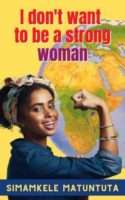There are many well-meaning compliments that society places on the shoulders of women. But they tend to do the opposite of what they’re intended. They’re burdensome and more insidious than we imagine them to be. Accepting them without probing forces us to operate under the confines of patriarchy, and I am tired of falling for this trap.
Adding the adjective “strong” next to the noun “woman” to form the phrase “strong woman” is one such example. I am going to admit, for a long time, I internalised the strong woman trope. I was always ready to pull up Google, books or whatever other resources that would guide me in my journey to becoming a strong woman.
The truth is people, especially women, unconsciously absorb beliefs about the model identity assigned to them. But now that I’ve seen this expression for what it is and know that transformation is a possible feat, I need it to be gone.
It now irks me in several different ways. It allows the othering of women, and it further embeds the narrative that women are inherently weaker than men. This narrow viewpoint gives society the green light to perpetuate sexism, misogyny and patriarchy without any consequences.
When you dig deep, you realise that a strong woman is another linguistic tool of oppression that also poses a severe threat to the well-being of the women given this identity.
A strong woman is expected to have extraordinary strength that ‘other’ women don’t possess. A strong woman is expected to endure difficult situations without complaining. A strong woman is expected to be on stand-by to give to everybody around her without any expectations to get something in return. A strong woman is expected to not ask for anything because she is strong enough to get it independently. A strong woman is expected to remain calm during a storm and not break at any point. A strong woman is expected to be an anchor for everybody and also for themselves.
This superficial empowerment robs women of access to the whole experience of being human. We are expected to perform like super humans while being treated as sub humans. And this is a treatment we experience in all spaces we find ourselves in.
Let’s take a look at the workplace; women in leadership positions are often praised and identified as “Lady Boss” or “Girl Boss”. I use an example of women in leadership positions as they’re usually the ones seen as strong women because they shatter glass ceilings. But the reality for these women, and those like me in junior positions, is that we’re still earning significantly lower than men. So, in the end, all strong women get are feminine descriptors that make them sound like they have everything they need when in fact, they don’t. But because they’re strong women, they can’t complain about this blatant exploitation and every other discriminatory challenge they face in this setting.
Now let’s look at romantic heterosexual relationship settings; society talks about how great it is to date a strong woman because a strong woman is not looking for a man who will swoop in and save them. That a strong woman doesn’t need a man but wants them. That a man doesn’t have to take care of or nurse her feelings. That a strong woman is not needy but is trusting, secure and loyal. That a strong woman endures relationship “ups and downs” no matter how they manifest. And, this is something that is constantly grilled in women.
If you’ve ever been to a non-white wedding or watched the wedding show, Our Perfect Wedding, you’ll have noticed how only the bride is always encouraged to be strong and endure whatever marital issues they encounter because “men will be men”. All of this tells me that a strong woman is expected to give and give and give even when they have nothing left to offer and receive nothing in return. In most cases, this woman endures abuse because they’ve been trained to suffer in silence. In a worst-case scenario, a strong woman can only reveal the scars from a body bag. The proof of this is in the numbers in gender-based violence cases in this country alone.
Based on these two points alone, I am exhausted and fear for the strong woman. Because while the expression remains widely used, there’s no hope for any tangible and radical change to ensure that all women have access to the whole experience of being human.
As for me, I don’t want to be a strong woman. That is not to say I am weak. It’s to say that I am human and want to be treated like one. I want to be free from the exhaustion of not needing anyone while being a sponge for others. I want to cry on my pillow when I feel sad. Be angry and frustrated when I face challenges that warrant this reaction. I want the freedom to complain about discrimination of any kind. I want my life to be saved from any abusive situation I may find myself in. I want affection, appreciation, and a soft place to land at the end of the day. And I am sure every single woman feels exactly the same.
***
This piece is part of a special collection of essays and poems called Women in the World. Click here to browse more stimulating reads.
Tell us: What do you think about this piece?




